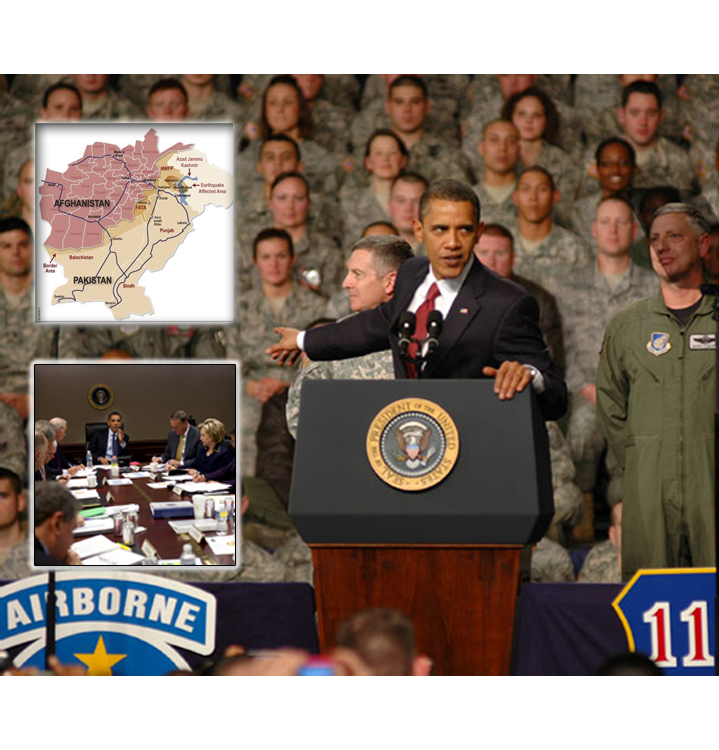By June 1, there will be about 100,000 troops in Afghanistan with a mission of weakening the Taliban, rooting out Al Qaeda and helping the Afghan government bolster its own forces.
President Obama’s wartime decision comes after weeks of private Situation Room meetings between key Cabinet members, generals and his national security team. After nine of those meetings, Obama also has spoken with world leaders and allies who are backing him by sending more troops of their own.
Republicans after weeks of blasting Obama for taking too long already are hailing the decision as the right one. Meanwhile, left-leaning groups question the cost in both blood and treasure, and Code Pink is out with a tough new flier mocking Obama’s “hope” slogan and marching in front of the White House today.
Obama at 8 p.m. in a speech at West Point will set a timetable for withdrawing those troops and benchmarks, the White House says, for evaluating success there.
Mindful of the political repercussions, the DNC tells the 2.7 million on the Obama Twitter feed that he will “lay out the path forward” in Afghanistan.
White House aides say Obama is not making the decision lightly – especially given the letters he signs to grieving military families and his recent trip to Dover to honor fallen troops returned home for burial – and the administration knows with more boots on the ground that will inevitably lead to increased casualties.
No one should be surprised Obama has upped the troops in the region – it’s an issue he campaigned on from the beginning of his presidential run in 2007.
But it’s also important to remember that Obama already sent more troops to Afghanistan – nearly 40,000 more. This new surge of troops comes following a highly publicized report by Gen. Stanley McChrystal, who warned without an increase of at least 40,000 the U.S. would face “mission failure.”
TPMDC interviewed military families and those currently serving, and a common theme has emerged – they are worried the policies Obama put in place to allow for longer “dwell” time between deployments might have to go out the window to maintain such a high number of forces in Afghanistan.
When Obama nearly doubled the number of troops in Afghanistan earlier this year, pundits declared it was now “his” war. Now, MSNBC’s Keith Olbermann is calling for the troops to come home and some Democratic leaders are suggesting a “war tax” to pay for it.
CNN is reporting that Obama will bring the war to a close within three years and administration officials are saying the war will end before Obama’s term is up. (Officials told reporters later the drawdown would “start” in 2011, but be subject to conditions on the ground.)
Beyond the specifics, which the White House will lay out in more detail for reporters this afternoon, here’s what we know.
The White House (and Pentagon) were frustrated with leaks during the process.
Obama is wary of the cost, with Press Secretary Robert Gibbs repeatedly telling reporters that 10,000 troops equals about $10 billion.
“The costs of our involvement in Afghanistan, both in terms of our men and women in uniform, the health of the force, and what this will mean budgetarily I can assure you have been part of this discussion from the very beginning,” Gibbs said Monday.
We also know that historically the American people will rally behind a president following a wartime decision.
Jon Soltz, and Iraq War Veteran and Chairman of VoteVets.org believes Obama will get a boost after the speech, but cautioned the polls may not hold given the war has gone on for eight years.
“There will be a tremendous amount of skeptics on his left, and that will continue to grow after [tonight] because after that he owns it,” Soltz said.
Soltz said VoteVets members are worried the policies such as the 2-year dwell time between deployments are “at risk” because “the math doesn’t add up.”
A poll of members showed more than 50 percent want a limited mission, he said.
Soltz said he is concerned about corruption in the Karzai government and fears Obama is “putting the burden of this country’s foreign policy on a 21-year-old kid” instead of the taxpayers, the nation or Congress.
Ed. Note: This post has been updated.









